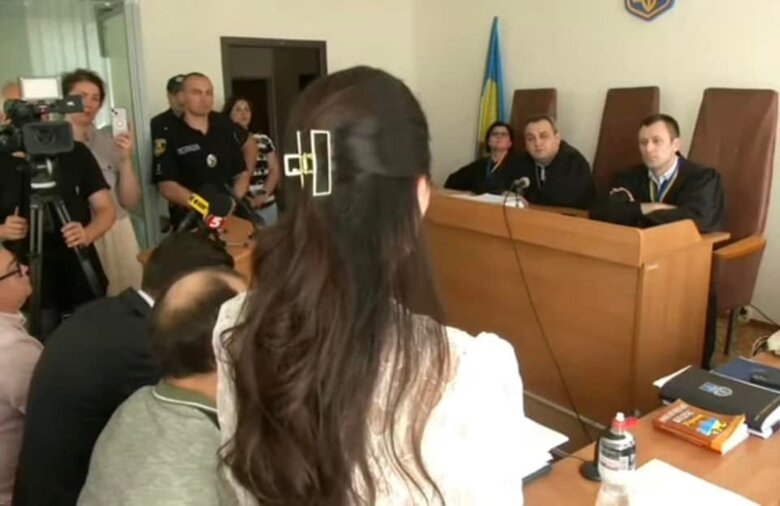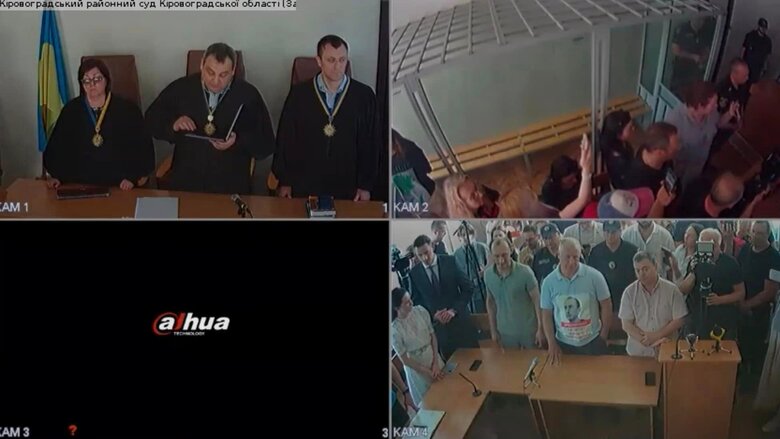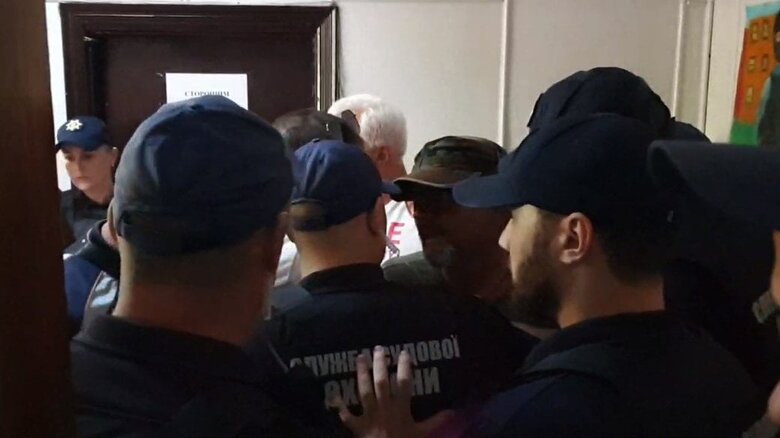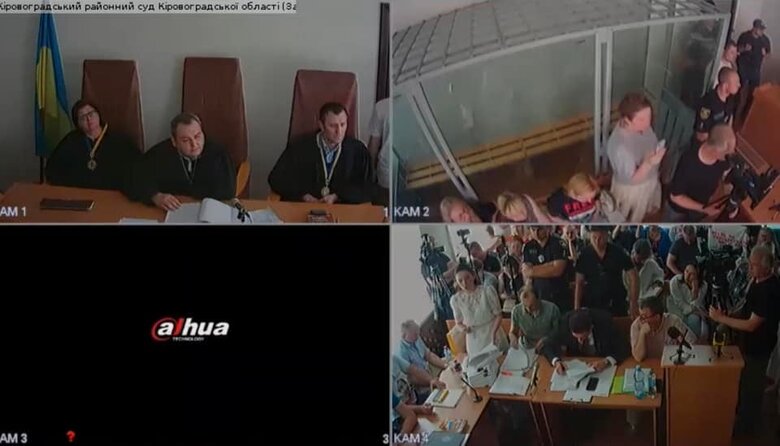Lawyer Liudmyla Kusa: Investigation said that it would interrogate Zaluzhnyi in Chervinskyi’s case, but this has not been done in year
Neither the press nor the public representatives who came from different regions of the country to Kropyvnytskyi to support him will be allowed to attend the court hearings in the high-profile case of SOF colonel and ex-intelligence officer Roman Chervinskyi, as the panel of judges decided to consider the case in camera.
The arguments made by the defendant’s lawyers about the groundlessness of the charges did not convince the judges that the indictment should be returned to the prosecutor’s office. They also failed to take into account the fact that not only the defendant’s defense lawyers but also one of the victim’s representatives insisted on its return.
In general, the last meeting was quite tense. It began with the fact that the hall was changed to a smaller one than it had been before, and a significant number of free spectators were not allowed in, with guards with iron shields standing against them. It is not known why such measures were taken on this particular day, but the space in the courtroom was so small that the lawyers had to sit next to the prosecutor and voice their complaints and motions in this way. As a result, the judges granted some of them. We asked his lawyer Liudmyla Kusa about what they did not take into account and how this will affect the further consideration of Chervinskyi's case.
- At the previous hearing, the court partially granted the defence's motion. What was the most important thing that the judges did not grant?
- A request for discovery of documents related to the protection and defense of the airfield. They regulate the procedure for how equipment should be located there, how it should be protected from threats, including missile attacks. They also regulate how military personnel should behave at a military airfield. Including in the event of an air raid alert.
We want to provide this information to the court because the materials provided by the pre-trial investigation authorities do not contain this information. And this is mandatory. If Roman Chervinskyi is accused that the soldiers received certain injuries while at the airfield, we need to find out where exactly they were, whether they were in a shelter. Because the air raid alert had been in effect for more than 4 hours at the time of the missile attack. Therefore, it is necessary to find out whether they acted in accordance with all instructions at that time.
In addition, military equipment is not stored at the airfield in a haphazard manner. It is stored according to certain standards and instructions. It has to be placed in certain shelters.
So we need to make sure that the relevant instructions exist. Find out what they say and whether they were followed. And only then can we say whether one person is to blame for what happened. The first thing we have to remember is that there must be a direct causal link between the actions of the accused and the consequences that have occurred. In other words, it must indicate that the actions of this particular person caused these consequences.
I have repeatedly drawn the court's attention to the fact that we are talking about the aggression of the Russian Federation and that is why we have missile attacks, not because some soldier allegedly did something wrong. But we have to examine all these materials in court.
Unfortunately, we, as the defense, are limited in our ability to these documents discovery. We tried to do so during the pre-trial investigation. But we were denied because they contain military and state secrets. And we could not get them. That's why we are raising the issue of their demand before the court. Because the court's decision on this is binding. Failure to comply with it entails criminal liability.
Therefore, in the future, we will definitely file another such motion. As with other documents on which the court has not made a decision.
- The defence insists on interrogating witnesses, including Valeriy Zaluzhnyi and Ivan Bakanov. Who else should we expect to be interrogated?
- We did not request the interrogation of any specific witnesses or all the witnesses we wanted to interrogate. We appealed against the actions of the pre-trial investigation body. For example, with regard to Zaluzhnyi. We appealed against the fact that the investigation granted us a request to interrogate him back in June last year. As of June 2024, he had never been examined. Moreover, not a single summons for him to appear for questioning has been sent. In other words, we could not help but note that our request, which was granted, has not been fulfilled.
We had to say this in court so that the court would not later point out to us why we did not raise this issue. Because at later stages of the trial, although the issue of witnesses is resolved, the defence may not be satisfied with the questioning of a particular witness, because the lawyers did not take steps to question him or her and did not question him or her themselves. The lawyer first interviews the person and then relates this witness. However, since we did not manage to interrogate Mr. Zaluzhnyi, and we asked the investigation to do so, but this was not done, we had to tell the court about this at the preparatory hearing. And, accordingly, to ask for the interrogation of this witness.
The same goes for Mr. Oleshchuk. He is the commander of the Air Force. We also asked the investigation to interrogate him with our participation. However, the investigation interrogated him independently and did not ask him a number of questions. Therefore, we appealed against these actions of the pre-trial investigation body in the preparatory hearing.
In the future, during the trial, when we find out which witnesses will be called by the prosecution, our list of witnesses can certainly be much more extensive and supplemented. This will include people who served with Roman, who can provide him with characteristics.
This includes witnesses whom the prosecution does not want to call or interrogate for some reason, and we will consider that their testimony is important to us. Therefore, these are the priority stages and witnesses with whom there was a problem during the pre-trial investigation.
And in the future, these issues will be revisited several times. And perhaps we will bring several dozen more witnesses to the court.
- You said that the investigation did not ask Oleshchuk a number of questions. Which ones?
- When we applied for this interrogation, we understood the importance of this witness. Such a procedural action, which is requested by the defence, is always carried out with the participation of lawyers. This is a direct provision of the Criminal Procedure Code. The investigation, in violation of this, interrogated him independently, without our participation, and we were unable to ask him any questions.
From the case file, we know that the witness said that he did not remember some things. But the investigation was not particularly interested in his recalling them.
- Liudmyla, please clarify the situation with the victims. Because the lawyers of some of them stated that their clients did not consider themselves victims and asked to return the indictment to the prosecutor's office. Why did this happen and how can it affect the case?
- The difficulty with the victims is that all of these people are military personnel, they serve in different parts of Ukraine and it is extremely difficult to bring them together in one court hearing. Two of them actually claim that they are not victims of Roman Chervinskyi's actions. They are victims of the actions of the Russian Federation. And they have no claims against Roman Hryhorovych.
All the others either do not appear in court, or their representatives come but do not show any active position that they consider him guilty.
In the future, all of these persons will be subject to interrogation in court, so we will gradually find out everyone's opinion on this criminal proceeding.
It is also important to note the algorithm of how they were recognized as victims. All the people who were injured at the airfield on the day of the missile attack were interrogated in Kropyvnytskyi in the criminal proceedings opened due to the armed aggression of the Russian Federation. When the criminal proceedings against Chervinskyi were opened, they were automatically transferred to this case. The investigator interrogated some of them, sent relevant instructions to the authorities that were closer to these victims geographically and issued decisions recognizing them as victims. There are no statements that they wish to be victims, so it would be a very good question to ask each of these people whether they really believe that Roman Chervinskyi is guilty of what happened, or whether they are victims of the actions of the Russian Federation.
- At the last hearing, the lawyer of one of the victims insisted that his client had not filed a statement that he considered himself a victim.
- This lawyer claimed that his client had been interrogated exclusively as a witness in criminal proceedings. And this is true. This person was not even interrogated as a victim, and therefore he asked to return the indictment to the prosecutor for revision so that his principal could be excluded from the list of victims. Because he is not one and does not consider himself one.
- But the indictment was not returned. What now?
- The court left a person who does not consider himself a victim. I have no comments on this - it's a bit of a surreal story. A person comes to court and says: I am not a victim, I have no complaints. The court says: fine, and takes the indictment for consideration. The court has a different opinion, the court is the arbiter.
- In the future, can this person refuse this status?
- It can. However, the court creates certain additional responsibilities for this person, which the person has not acquired and does not want to acquire. And the court automatically recognizes the person as a victim when it appoints the case for consideration. And this person now has to come to the court hearing and be interrogated as a victim, although this person did not acquire such a status. This is the mechanism that the court has now created.
- How do you feel about in camera hearing?
- Of course, negatively. Because our client has always insisted on open court hearings. I support his position that this case is extremely interesting to the public. This is confirmed by how many people support him at court hearings.
The case of Chervinskyi is extremely interesting for the military and the military leadership in particular, who need to understand what exactly they can be held criminally liable for in this country. Since we have repeatedly raised the issue of the fact that the indictment does not specify any intent or criminal purpose, the prosecutor's office has not found this mandatory element of the crime, so what was the criminal intent and what was it. But the military officer is being tried and it is believed that the purpose was clearly criminal, in that the Russian aircraft was to be handed over to the Armed Forces of Ukraine.
- The decision of in camera hearing cannot be appealed?
- This is an interim decision, which is appealed together with the court's verdict.
- Can you file a motion to open the meeting?
- We can do this, but unfortunately, the criminal procedure law clearly stipulates that it is in the preparatory hearing, when the court schedules the case for consideration, that it decides whether to hear the case in open or closed session.
- In other words, this trial will be in camera until the verdict?
- I think so. I very much doubt that anyone will change their mind and decide to make a decision that is not provided for by the CPC and open court hearings.
- Why do you think this was done? Your colleague, lawyer Andrii Yosypov, says that only one volume in the case file is classified as secret. And there is supposedly nothing else to classify this process.
- It is true. For the past six months, we have been hearing in open court and all of this has been broadcast live every time. Indeed, one volume is secret. I filed a petition with the court to hear the case in open court and asked to close the court session only in terms of examining evidence that is a state secret. I think, like Andrii, that it is enough to consider the documents with stamps in a closed court session, in a special room, as is done by law, and then we could return to an open hearing. It's the same with witnesses. If the witnesses who are military personnel would like to give their testimony in a closed court session, I think that it would be possible to move to a closed part, not to show the faces of the military personnel. I do not consider this a problem. But all other court hearings could easily be held in open court.
- Another of Chervinskyi's lawyers, Kostiantyn Hloba, told our publication in an interview that lawyers' inquiries were sent to a number of expert institutions, asking whether any examinations were being carried out. And one of them replied that the examination was still underway. And this was, according to him, after the pre-trial investigation was over. He also explained that it was not in the case file, which was provided to the defense for review. Do you know anything about this examination?
- In August 2022, as part of the criminal proceedings against Roman, even when he was not suspected, an expert examination was ordered to determine whether the air defense system had serviceability status or malfunctioned. This is a military examination that should have given the investigation an understanding of whether Roman was really the only one to blame, or whether the situation with the shelling of the airfield was influenced by air defence systems that may not have worked or worked incorrectly. For what reason it did not work. Unfortunately, despite the fact that other military examinations in this case, which pointed to Roman's guilt, were done in two weeks, this one has been going on for almost two years. Its results are still unknown, it is still not ready. It is still being done for some reason.
In October last year, this proceeding against Roman was separated into two. One proceeding remains, and we are hearing it today about his abuse of power and authority. The other criminal proceeding, which deals with high treason (Article 111 of the Criminal Code), was separated. So they separated this examination, which has not yet been conducted, into that proceeding.
But if this is a high treason case, will I, as a lawyer, have the opportunity to see this examination later? After all, they can assign it a certain classification, say that it contains information that constitutes a state secret, and close it. Even if it says that the shelling of the airfield was caused, among other things, by the failure of air defense, I may never see this expertise in the end.
- Shouldn't it be presented as evidence in court?
- No, since they have allocated it to another criminal proceeding, they have the right not to provide it to the court.
- What is the point of it in general?
- For the investigation, I don't know what it is. For me, the point of it is that it can prove that my client is not to blame for the failure of the air defence system.
- I don't understand the logic of separating it into another proceeding. What do you think?
- If it gives them an opportunity to exonerate my client, they simply hide it. Why do they need an expert opinion that will show that the air defence system did not work?
Tetiana Bodnia, Censor.NET




